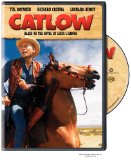| Reviews & Columns |
|
Reviews DVD TV on DVD Blu-ray 4K UHD International DVDs In Theaters Reviews by Studio Video Games Features Collector Series DVDs Easter Egg Database Interviews DVD Talk Radio Feature Articles Columns Anime Talk DVD Savant Horror DVDs The M.O.D. Squad Art House HD Talk Silent DVD
|
DVD Talk Forum |
|
|
| Resources |
|
DVD Price Search Customer Service #'s RCE Info Links |
|
Columns
|
|
|
Catlow
Warner Bros. has released Catlow, the 1971 comedy western from M-G-M, based on the novel by Louis L'Amour, and starring Yul Brynner, Richard Crenna, Leonard Nimoy, and the luscious Daliah Lavi. Directed by expatriate actor Sam Wanamaker, Catlow plays like three or four made-for-TV westerns all jumbled together to often ill-fitting - but innocuous - effect. Certainly the highlight of the film is Brynner's loose-as-a-goose performance, something the usually imperious, wonderfully pompous actor wasn't exactly known for in his screen incarnations. Western fans will certainly want to at least check out this once-staple of the afternoon TV movie programs.
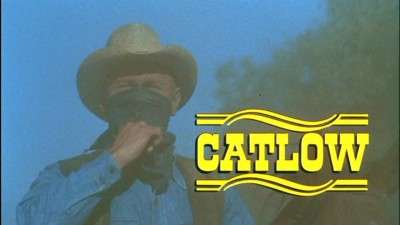
Playing out their long relationship like a relatively benign western version of Tom and Jerry, lawman Marshal Ben Cowan (Richard Crenna) is tracking yet again his old wartime buddy/adversary, Catlow (Yul Brynner). Exercising a warrant issued on behalf of rich cattle baron Mr. Parkman (Walter Coy), Ben is looking to haul in Catlow for rustling cattle - that is until Ben runs into some Indians who almost finish him off before Catlow and his men save him. Catlow bemusedly patches up the injured lawman before hired killer Miller (Leonard Nimoy) and his men arrive to gun Catlow down. Listening to Miller, Ben discovers that Parkman isn't interested in the law (something the stubborn, slightly clueless Ben certainly is); he's only interested in blowing away cowboys like Catlow who legally herd up "maverick" cattle, thus saving himself considerable expenses by not having to pay real wages to a cowboy crew.
Catlow tries to bring Ben over to his side, telling him there's a Mexican mule train of gold that's itching to get boosted if only he'd help out. But Ben isn't having any of it, especially when he finds out the gold originally came from the Confederates during the War Between the States - gold that rightfully should be returned to the United States government. But Ben doesn't count on the relentless pursuit of Miller, nor on falling in love with beautiful Christina (Jo Ann Pflug), the cousin of Recalde (Julian Mateos), the Mexican soldier that Ben saves from a marauding Indian party. Add to this busy mix the appearance of fiery hellcat Rosita (Daliah Lavi), Catlow's woman, and this western party is ready to explode like dynamite.
SPOILERS ALERT!
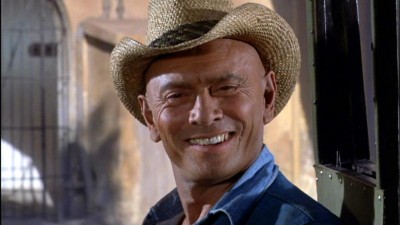
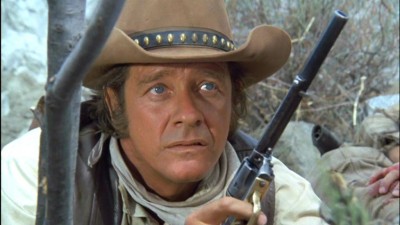
I wish I could have had as much fun watching Catlow as it appeared the cast did making it, but its jovial little groove wasn't always enough to paper over the numerous lapses in story construction, direction and editing that marred what could have been a lightweight but memorable Western. The odds were certainly stacked against Catlow right from the start of production. As I wrote in my recent review of Doc, by the early 70s, the large-scale traditional studio Western was just about dead as a reliable, viable genre product, with the yearly John Wayne efforts some of the last few that earned any kind of substantial profits. Instead, spoofy genre tweaks like Butch Cassidy and the Sundance Kid or genre-busting revisionist Westerns like McCabe & Mrs. Miller or Soldier Blue vied for critics' attentions and audience dollars. Of course, that is, if the moviegoers weren't already at the drive-ins enjoying the phenomenally successful spaghetti westerns coming out of Italy, a cycle of films that was already starting to wind down with the relative U.S. box office failure of the genre's master Sergio Leone's last two efforts (Once Upon a Time in the West and A Fistful of Dynamite), and the stunning success of Terence Hill/Bud Spencer Trinity spoofs (which signaled an eventual artistic turn in the genre to increasingly broad, unsophisticated slapstick). So where was a relatively pokey, unremarkable little comedy Western like Catlow going to fit in?
It certainly didn't have the star appeal of other bigger studio efforts, either. Yul Brynner, once a top box office draw in the late fifties, had by now unmistakably sunk to B-list fare, even if he was still a recognizable "star" to the public. After appearing in his last big iconic role as gunslinger Chris Adams in John Sturges' The Magnificent Seven (a starring role, ironically, that was overshadowed by newcomer Steve McQueen), Brynner had been slotted into increasingly unsuccessful action pictures like Escape from Zahrain, Flight from Ashiya, the notorious Poppies Are Also Flowers, The Double Man, and The File of the Golden Goose (with Catlow director Wanamaker). By Catlow's time, Brynner was a familiar but uncompelling name for audiences which had moved on to new action heroes like Clint Eastwood, Steve McQueen, and Charles Bronson. His co-stars didn't exactly help sell tickets, either, with excellent supporting player Richard Crenna never advancing further than just that (efforts to push him into leading status such as John Goldfarb, Please Come Home!, Made in Paris, Star!, Midas Run, Marooned, and Doctors' Wives had failed to do so), while Leonard Nimoy, recently finishing up a stint on TV's Mission: Impossible, was still years away from truly cashing in on the ballooning Star Trek cult. And with the lack of any strong female box-office clout (Daliah Lavi, a personal favorite of mine, was always busy but never a top draw, while poor Jo Ann Pflug, failing to capitalize on her recent brush with fame co-starring in M*A*S*H, suffers the ignominious distinction of being dubbed here), Catlow was already looking distinctly low-rent before it ever rolled the cameras.
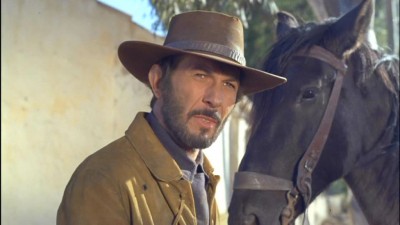
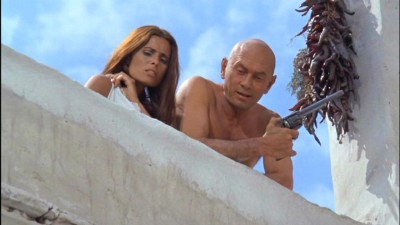
It didn't help, either, that Catlow's director wasn't strong enough to pull together the disparate story elements here into a cohesive whole. Wanamaker, although a director of note on the stage, wasn't as successful in his big-screen efforts (although he did work steadily in television), with his first two efforts, 1969's The File of the Golden Goose, and 1970's The Executioner (with George Peppard), failing to impress either critics or audiences (Wanamaker would hit it big with international audiences with his last big-screen feature film, Sinbad and the Eye of the Tiger, although it was perceived more as a "Ray Harryhausen film"). And too much of Catlow seems scattered all of the place to make much impact. I don't mind that the film switches tone from comedy to actioner without any rhyme or reason - that atmosphere is distinctly "seventies" as filmmakers tried to inject post-modern aesthetics into traditional genre frameworks. It's also rather fun at first when we're trying to figure out if Catlow is going to be a standard oater as Crenna is stalked and arrowed by the Indians, only to having the laughing, smiling Brynner fix him up...and dismiss his law-enforcement efforts with aplomb. Brynner, looser than I've ever seen him in a picture, is obviously having a ball here playing the playful Catlow; he's the film's one big jolt of energy...when he's on screen.
But eventually, the story has to take hold, and the countless backtracking in the cat-and-mouse game between Catlow and Ben becomes rather pointless when first Catlow and then Ben disappear from the story for extended periods of time (as well as Nimoy's Miller, who exits in the third act, almost forgotten, until an ill-advised final appearance like some kind of Western Jason Voorhees). Was this even-steven approach to Brynner's and Crenna's screen time already in the script by Scott Finch (the inferior Shalako) and J.J. Griffith? Or did it happen in the editing? It's hard to say, but it's apparent that important transitional scenes are missing throughout the film - or weren't written? - such as Crenna's and Pflug's dance sequence, where we're supposed to hear them coming together, or discuss their future, or identify their barriers, but which we never get (you can sense it was there, but cut from the final print). Just when we're getting into the Catlow sequences, he goes away and Crenna takes over (with the Julian Mateos sequence). And once we settle into that section of the film, Catlow comes back on the scene, trying to steal the gold and punching out Lavi, and everyone fighting off Indians. It's a mishmash of a story to be sure, one that might not have been too objectionable had the director coalesced it with some kind of overall structure.
Even ignoring the shifts in tone, as well as the appearances and disappearances of actors as the script switches from subplot to subplot, Wanamaker just can't seem to give Catlow the lift it needs to bring its elements any kind of distinction. For an action/comedy Western, Catlow is downright sedate in both departments, and that's criminal for a Western that doesn't aspire to be a character study or a chamber piece. Catlow has to move if it's going to work, and its action has to be fast and hard, but at 101 minutes, Catlow lurches in fits and starts with sequences that look no more distinguished than the average anonymous TV Western episode (ace cinematographer Ted Scaife - Night of the Demon, Khartoum, The Dirty Dozen, The Kremlin Letter - seems oddly constricted here, with unmemorable, flat compositions and dullish lighting). Add to that usually boisterous composer Roy Budd's oddly-mismatched theme music (think "Aaron Copland meets That Girl") and you've got a flatly-shot, tunefully-odd Western with subplots galore and no resolutions for them, characters that come and go at will, and action scenes that aren't special enough to make you forget that they're often-times unmotivated. And that gives you oddball Catlow: misshapen, misguided, and ultimately, a miss altogether.
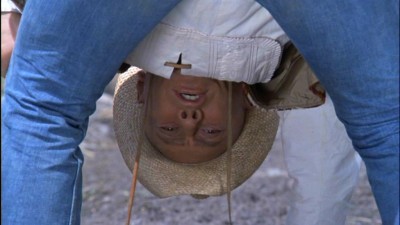
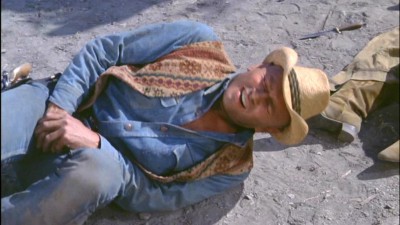
The DVD:
The Video:
The transfer is equally unremarkable. Warners' anamorphically-enhanced, 1.85:1 widescreen transfer for Catlow seems to have sourced a slightly washed-out print (with minimal damage), with colors that are at times muted. The image itself is acceptably sharp, with the expected level of grain visible. Other than the opening cattle drive where I saw some picture breakup in a particularly dusty sequence, the authoring looked fine, with no other compression issues.
The Audio:
The Dolby Digital English mono audio track no doubt accurately reflects the original theatrical presentation. All dialogue is heard cleanly, but overall, it's a predictably flat presentation. English subtitles and close-captions are available.
The Extras:
Other than an original trailer (which gets across a decidedly fun tone), there are no other extras on Catlow.
Final Thoughts:
You want to just groove along with Catlow's shaggy-dog rhythms and odd-ball editing constructions, but eventually you figure out that what might have been post-modern design is in reality just sloppy scripting and filmmaking. The cast is relatively colorless with the exception of Brynner, who's a hoot when he's allowed on screen (Nimoy, all pinched, squinchy eyes and relentlessly humorless demeanor, shows why he eventually went behind the camera), and the action undistinguished. Catlow is a rental for all Western fans who may not have caught it back in the mid-70s when it seemed to show up on TV every other week. Anyone else not of the oater obsession can safely skip it.
Paul Mavis is an internationally published film and television historian, a member of the Online Film Critics Society, and the author of The Espionage Filmography.


|
| Popular Reviews |
| Sponsored Links |
|
|
| Sponsored Links |
|
|
| Release List | Reviews | Shop | Newsletter | Forum | DVD Giveaways | Blu-Ray | Advertise |
|
Copyright 2024 DVDTalk.com All Rights Reserved. Legal Info, Privacy Policy, Terms of Use,
Manage Preferences,
Your Privacy Choices | |||||||









